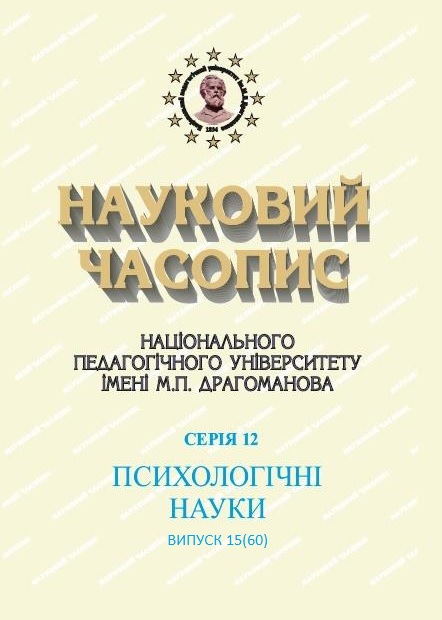ABILITY TO FORMULATE PROFESSIONAL UTTERANCE AS A COMPONENT OF COMMUNICATIVE-SPEECH COMPETENCE OF A FUTURE PSYCHOLOGIST
DOI:
https://doi.org/10.31392/NPU-nc.series12.2021.15(60).10Keywords:
professional utterance of the psychologist, сriteria professional utterance of the psychologist, professional competence, communicative speech competence, psychologist speech, culture of verbal communication psychologist.Abstract
The article presents a theoretical review of the specifics of the speech activity of a psychologist, the peculiarities of their professional saying as a method of psychological influence on a client in the process of psychological counseling. Some сriteria have been defined in professional utterance of the psychologist. The results of identifying the levels of development of the ability to formulate professional statements in future psychologists as a component of their communicative speech competence have been presented. It was noted that the training of a future specialist should be focused on the formation of a professional psychologist who has a high level of professional culture, a culture of verbal communication, should have competence in general, communicative competence, and, in particular, communicative speech competence. The psychologist’s speech communication culture is a complex systemic formation of the personality of a specialist, which is an integral behavioral component of their communication culture and takes place in the phase of realization of speech actions externally using speech means adequate to the goals of professional communication. Therefore, the future psychologist should strive for the highest degree of their professional
perfection – the master of speech activity. As a result of an experimental study of the levels of development of the ability to formulate professional statements in future psychologists using the methods of research developed by us and on the basis of the criteria we defined for professional statements of a psychologist, we identified the shortcomings of professional communication and speech training of future specialists in higher education. A significant number of students with a low level of development of the ability to formulate professional statements were identified. The necessity of the development and implementation of psycho-technologies of the formation and development of communicative speech competence in the educational process with the aim of increasing the effectiveness of communicative speech training of future psychologists has been proved. They should be carried out with the use of active teaching methods with the goal of acquiring students’ ability for professional speech interaction and mastering the ability to formulate professional statements in solving practical situations close to the real conditions of professional activity.
References
- Abramova, H.S. (2003). Praktycheskaia psykholohyia: uchebnyk [Practical psychology: textbook] [dlia stud. vuzov]. Moscow : Akademycheskyi proekt [in Russian].
- Artemova,O.I. (2014). Formuvannia komunikatyvnoi kompetentsii maibutnikh psykholohiv u protsesi profesiinoi pidhotovky [Formation of communicative competence of future psychologists in the process of professional training]. Psykholynhvystyka. Psycholinguistics, 5, 10–16 [in Ukrainian].
- Bondarenko,A.F. (1991). Sotsyalnaia psykhoterapyia lychnosty (psykhosemantycheskyi podkhod) [Social psychotherapy of personality (psychosemantic approach)]. Kyiv [in Ukrainian].
- Bondarenko, A.F., & Fedko, S.L. (2017). Sotsiokulturna kompetentnist praktykuiuchykh psykholohiv: suchasnyi stan i perspektyvy [Sociocultural competence of practicing psychologists: current status and prospects]. Psykholinhvistyka, 21(1), 23–40. https://psycholing-journal.com/index.php/journal/article/view/39 [in Ukrainian].
- Varfolomieieva,O.V. (2007). Kontseptualni pryntsypy profesiinoho stanovlennia psykhoterapevtiv: akmeolohichnyi pidkhid [Conceptual principles of professional development of psychotherapists: acmeological approach]. Visn. NTUU «KPI». Filosofiia. Psykholohiia. Pedahohika : zbirnyk naukovykh prats, 2(20), 1, 60–63 [in Ukrainian].
- Vasyliuk, F.E. (1992). Ot psykholohycheskoi praktyky k psykhotekhnycheskoi teoryy [From psychological practice to psychotechnical theory]. Moskovskyi psykhoterapevtycheskyi zhurnal, 1, 15–32 [in Russian].
- Vaskovskaia,S.V., & Hornostai P.P. (1996). Psykholohycheskoe konsultyrovanye: sytuatsyonnыe zadachy [Psychological counseling: situational tasks]. Kyiv : Vishcha shkola. ISBN 5-11-004695-6 [in Ukrainian].
- Vaskivska, S.V. (2011). Osnovy psykholohichnoho konsultuvannia [Basics of psychological counseling]: pidruchnyk dlia stud. vyshch. navch. zakladiv. Kyiv : Nika-Tsentr, 424. [in Ukrainian].
- Herasina,S. (2017). Dilova kompetentnist yak determinanta sotsialno-komunikatyvnoi kompetentnosti studentskoi molodi [Business competence as a determinant of social and communicative competence of student youth]. Psycholinguistics. Psykholynhvystyka, 22(1), 43–57. https://org/10.5281/zenodo.1087466 [in Ukrainian].
- Hornostai,P.P. (2018). Konsultatyvnaia psykholohyia : Teoryia y praktyka problemnoho podkhoda [Counseling Psychology: Theory and Practice of the Problem Approach].
ISBN 978-966-521-720-6 [in Ukrainian]. - Kalyna, N.F. (2000). Lynhvystycheskaia psykhoterapyia [Linguistic psychotherapy]. Kyiv [in Ukrainian].
- Poviakel,N.I., & Fedorenko, A.F. (2010). Praktychna psykholohiia profesiinoi adaptatsii/ dezadaptatsii [Practical psychology of professional adaptation / maladaptation]: navchalnyi posibnyk (dlia studentiv psykholohichnykh spetsialnostei). Kyiv : NPU imeni M.P. Drahomanova [in Ukrainian].
- Semychenko,A. (1998). Psykholohyia rechy [Psychology of speech]. Kyiv [in Ukrainian].
- Terletska,L.H. (1997). Ihry, v yaki hraiut dorosli (dosvid navchannia praktychnykh psykholohiv systemy osvity) [Games played by adults (experience of training practical psychologists of the education system)]. Praktychna psykholohiia: teoriia, metody, tekhnolohii, 220–226 [in Ukrainian].
- Khanetska, T.I. (2010). Kultura movlennievoho spilkuvannia psykholoha [The culture of speech communication of a psychologist] : navchalnyi possbnyk (dlia studentiv psykholohichnykh spetsialnostei). Kyiv: NPU imeni M.P. Drahomanova [in Ukrainian].
- Chepelieva,N.V. (1997). Formuvannia profesiinoi kultury maibutnikh praktychnykh psykholohiv [Formation of professional culture of future practical psychologists]. Metody pidhotovky fakhivtsiv do profesiinoho spilkuvannia. Cherkasy, 1, 34–42 [in Ukrainian].
- Chepelieva,N.V. (1999). Formuvannia profesiinoi kompetentnosti v protsesi vuzivskoi pidhotovky psykholoha-praktyka [Formation of professional competence in the process of university training of a psychologist-practitioner]. Aktualni problemy psykholohii : nauk. Zapysky, 19, 271–278 [in Ukrainian].
- Shevchenko,F. (2003). Osoblyvosti profesiinoho vyslovliuvannia psykholoha-konsultanta [Features of professional expression of a psychologist-consultant]. Problemy zahalnoi ta teoretychnoi psykholohii : zb. nauk. prats, 5(1), 293–299. [in Ukrainian].
- Carroll, D.W. (2007). Patterns of student writing in a critical thinking course: A quantitative analysis. Assessing Writing, 12, 213–227.
- Lord, S.P., Sheng, E., Imel, Z.E., Baer, J., & Atkins, D.C. (2015). More than reflections : Empathy in motivational interviewing includes language style synchrony between therapist and client. Behavior therapy, 46(3), 296–303.
- Vygranka, Т. (2019). The features of formation of speech c ompetence of future philologists in the educational process of institution of higher education. International Academy Journal Web of Scholar. 5(35), 26–30. https://doi.org/10.31435/rsglobal_wos/31052019/6502

